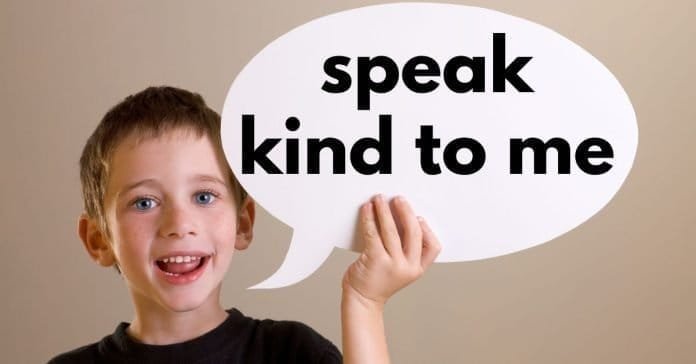How would it feel to be punished for repeating the swear words, demeaning remarks or even threatening comments you hear the adults around you use every day; or to be reprimanded for play punching or flicking someone as you walk by as many adults do to children in “fun?” Watch and listen in grocery stores, doctor’s offices, etc. and when you pay attention to how big humans talk to little humans, you may be shocked.
There are definitely times when we need to give children instructions or reprimand them, but would the delivery of these instructions differ if they were needed for a big human? Voice volume, facial expressions, frequency of occurrence all play a part in the deliverance of the things said to kids. What would happen in the workplace if name calling was a regular occurrence, especially if coming from a person in authority? Big humans are the authority figures, the teachers, and the examples to little humans. As we talk to these little ones, could we drop the name-calling? Soften the tones or eliminate the barking of the commands with intonations that evoke feelings of disgust?
Most parents love their children and are truly unaware that the pattern of their interaction is abrasive or demeaning. As a teacher, and also as a parent, I conscientiously endeavored to treat children as inherently good; they had their less-than-stellar moments, too, but recognizing that they had valid feelings, ideas and needs, helped me treat them with respect. Their feelings and ideas were not as refined as an adult’s, but important to them, just the same. Wanting a peanut butter and pickle sandwich was NOT something I would want to eat, but hey, what would it hurt to try it. However, if your thoughts are that YOU know peanut butter and pickles will taste bad and YOU know better, you may say, “Peanut butter and pickles do NOT go together. You can’t eat that!”
As big humans we have a lot of experience to draw on, and we need to give little ones opportunities to learn through safe experiences. I had many students come to school wearing “interesting” outfits, and sometimes parents would apologize saying, “He picked out his own outfit.” Stellar moment, mom, I thought. IF you REALLY care what they wear, perhaps setting out two outfit ideas that you approve of, and letting them make the final choice gives them experience and sends the message that their ideas are validated and valued.
Curiosity will help you pause and reflect on your interactions with the little humans in your life–considering how you would feel if you were spoken to or treated the way you treat them. If you notice a pattern that can be improved, commit to making changes to that less-than-stellar pattern.
Consider how the child may be feeling. A visit to the grocery store after a child’s normal bedtime, dragging her along because no one else is home to tend her, MAY result in a bit of whining or outbursts. She’s tired and cranky. You may need an extra dose of patience and understanding of her feelings. You may be tired, as well, but… you’re the adult.
Think about the normal behavior of the child – a child who constantly tries to avoid bedtime by saying he is hungry or thirsty – is very different from a child who usually goes to bed just fine, but tonight he is hungry. He may be going through a growth spurt and is truly hungry. Be careful; YOUR thoughts about the situation may be entirely different from what the child is actually thinking.
Give the benefit of the doubt and assume the best until you confirm otherwise. A cry of, “She hit me!” coupled with tears from the younger of two siblings could prompt you to automatically assume the older sibling hauled off and smacked the younger one. The truth may be that the younger sibling pestered the older one relentlessly until she ended the pestering with a smack. Sure, the older sibling may need some lessons in strategies for handling the situation without hitting, but the younger sibling needs some lessons, too.
Say yes and explain why as often as you can. Saying yes whenever you can, helps a child when the answer no is necessary. A sign that reads, “Stay off the grass,” is softened by the explanation, “Please stay off the grass. New seeds were just planted.” Admittedly, there are definitely times when an adult needs to tell a child, “No” and even times when the only reason is, “Because I said so.” But hopefully those responses can be the exception rather than the rule.
Treating little humans with respect and understanding takes conscious effort. ’m grateful I was required to develop this skill daily as a teacher; it helped immensely in my parenting. It’s important to remember that the little ones today will one day become big people. How they interact with other adults or the little humans in their lives will be influenced by how they were treated as little humans.
Submitted by Theresa Olesen


